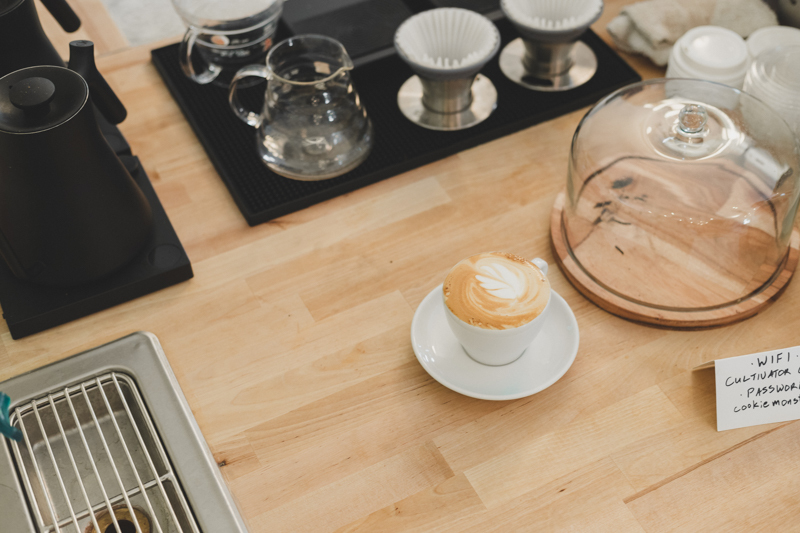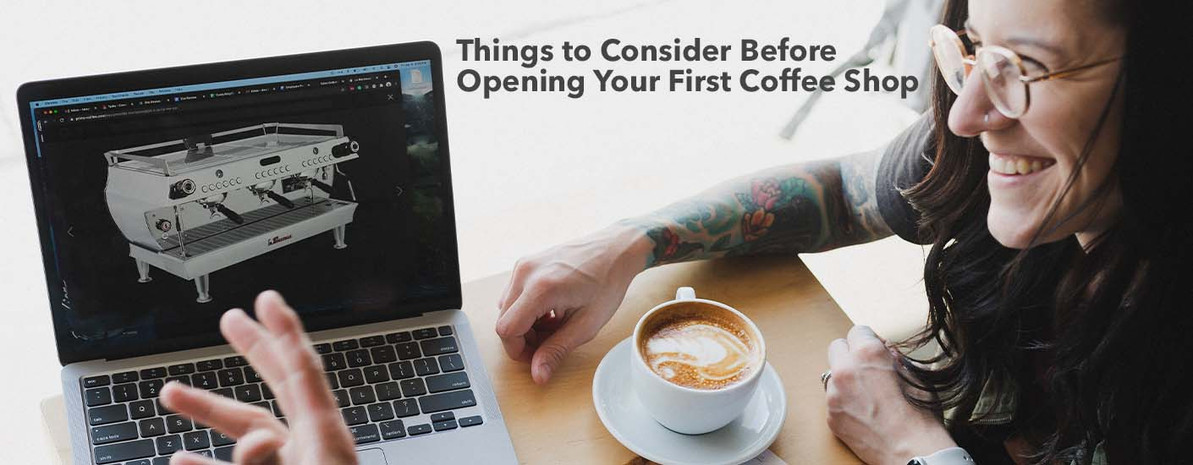7 Things to Consider Before Opening a Coffee Shop
Lost in a daydream of cafe patrons lounging at tables, the roar of the grinder and squeal of the steam wand, the aroma of freshly brewed coffee engulfing the room — you know the time has come to make this dream a reality. It’s a big decision to say the least, but with the right planning and tools, you too could own the cafe of your dreams.
The vision is burned into your mind, but the execution plan is still a little hazy. Statistics show that proper planning can mean sink or swim, so weighing the cost and preparation of the coffee shop you envision to what may be achievable is the first, and quite frankly, the most important step. Despite the late nights googling "things you need to open a coffee shop", having conversations with other business owners, and making list after list of all the possibilities, you may still be unsure where to begin.
We have compiled a list of 7 of the most important things to consider and work through before opening up your very own coffee shop. In addition, we’ve provided a printable download that gives you the space needed to write down your thoughts, research and concerns on each topic.

Finances
It takes money to start a business, and for most, that number can be overwhelming at first. As frightening as it may be, it’s crucial to have a realistic idea of how much it’s going to get your business off the ground before any money starts pouring in. There are numerous factors to take into consideration, all of which will be discussed in more detail throughout this article, and each with its own price tag.
One of the first things to consider is location. Your location will help determine factors such as foot traffic, the types of customers you may expect, and proximity to competition. A good place to start is, of course, your desired area and begin comparing prices. If your desired part of town seems too costly or is lacking in available real-estate, explore your city further. There may be a hidden gem somewhere that you never considered. Additionally, check out our blog on location pitfalls to learn about things to look out for when deciding on a location. Once you’ve calculated a realistic estimate for rent, you must consider sources of funding.
Perhaps you’ve spent the last several years saving, maybe you have a business partner that can help cover the costs, or possibly friends and family who are willing to contribute, but for most people, looking for outside funding is a must. This can be achieved through various outlets such as applying for a small business loan. If you plan to take this route, shop around for the lowest interest rates. Going to your local bank or credit union that is familiar with you may work to your advantage. Additionally, there are many grants available to small business owners, and you may even have a niche that you haven’t thought about that makes you eligible. Forbes has a great article that explores these avenues in more detail.
Coffee Knowledge
Knowledge of what you’re selling is vital. From knowing how to make the drinks on your menu, to the grade of coffee you’re serving, and even expectations within the industry, with this knowledge you will be better equipped to serve your customers not only a drink, but an experience.
“understanding roasters, origins, and flavor notes will help you engage with, and even form lasting relationships, with your customers.”
If you intend on serving specialty coffee — coffee that is graded 80 points or higher on a 100 point scale by a certified coffee taster — and aren't familiar with it, it may seem overwhelming at first. But let us reassure you, it's an exciting journey to embark on, and will aid you when choosing your suppliers. The specialty coffee crowd will likely ask questions about the coffee they’re being served, and understanding roasters, origins, and flavor notes will help you engage with, and even form lasting relationships, with your customers. We have a robust learning center that can assist you through the process.
Although having a set menu is not necessary in the early planning stages, knowing the ratio of espresso to milk that goes into some of the most popular drinks, how to steam milk, and even making latte art, can prove valuable. Because as I'm sure you know, people love to show off their latte art.
We have some great resources on pouring latte art and the anatomy of espresso drinks.
Learning more about the coffee industry will come in time, but a great way to get a step ahead is to talk to people already submerged in it. Forming relationships with local roasters and other local coffee shop owners may seem unsettling at first, but you’d be surprised how well a simple introduction may be received. These relationships often prove to be mutually beneficial and will help you understand the industry you’re about to commit yourself to.

Brand Identity
Your brand encompasses everything you are, how you're perceived as a business and what sets you apart from the competition. This will act as your roadmap as you design your coffee shop, market yourself, interact with customers, and even shape your company culture.
A good way to begin developing this is to determine your target customer base, the feeling and vibe you’d like to present to them, and how you plan to achieve this. The basics — a catchy name, a logo, and an overall aesthetic — are just the tip of the iceberg. Do you imagine a modern, minimalist cafe, or perhaps a warm and cozy shop, detailed with wood accents and natural colors. All of these decisions matter and contribute to your overall brand.
Additionally, your brand needs a personality. This should align with your overall aesthetic. Do you want to be playful and humorous, or serious and classy, or perhaps warm and thoughtful. These are broad words, but will be the foundation of your interaction with customers both through marketing and face-to-face. This tone or personality can be derived from your brand story which should explain how you got to this point and how that has shaped your mission.
“This encompasses all that you are — the core of your business.”
Lastly, and this is a big one, you need to develop a company culture. This encompasses all that you are — the core of your business. It is your foundation and shows your company’s brand and core values executed day in and day out. These guiding principles need to be evident in all that you do, and through proper execution, it will become the day-to-day norm of your business, and thus, your culture.
Once all of these ideas have been thought through and made concrete, developing a brand book is an important step in order to give a place to reference when there are questions on matters of design, marketing and decision making.
Suppliers
Developing a menu plan is another important decision that must be made. In early stages, simply determining the basics such as, “I want to serve both espresso drinks and batch brew,” is a great start. If you will be serving milk drinks, do you want to offer alternative milk options or, perhaps, a variety of sugar and syrup options. There may be consumables you may not have thought about. The exact details can be determined later on, but with a general idea, you will be able to shop around and determine a realistic estimate.
Do your research on grinders, espresso machines, batch brewers, pour overs, and make an educated decision on what you think will work best for your projected cafe volume. Again, none of this is a one-size-fits-all, and we'd be happy to help you build a custom quote. From there, spend time researching and comparing prices and resources that each retailer or distributor offers to determine what best fits your needs. A little extra money can go a long way if additional services or resources accompany the product.
Marketing Strategy
Spreading the word weeks, or even months, before opening day will put you a step ahead come opening day. Building hype around a new coffee shop or cafe opening in the community will make for a larger turnout. Although there are some free routes to take in the beginning, investing in a marketing strategy will prove beneficial in the long run.
Social media is a great way to get the word out, and it’s easy to do this without spending a penny. Get your friends and family to spread the word by sharing your brand's page and encouraging likes and follows. This will broaden your reach when you post updates and announcements about your shop.
Paying for advertising on social media or in a local paper can be a good source of publicity too, but this often comes with a hefty price tag, so determine how much you’re comfortable spending in the first year, and decide the best route for your business.
From there, closer to the grand opening, look into email marketing services that can help you format and send out beautifully laid out and well crafted emails. Check out our email marketing blog for more information on the topic.
Hiring
As you work through the other details, you will begin to get a general idea of how many people you will need on your staff to keep the place running. This number will vary based on the size of the shop and the number of stations behind your bar. Researching the going pay for a barista in your area, as well as team structure will give you a better idea of how much money you will need to for payroll, as well as developing an idea of how this may evolve over time.
When it comes time to hire baristas, refer back to your brand and culture to hire someone who carries the same values. Traits such as charisma and sociability are always a plus, as it's not uncommon for people to become regulars and have a favorite barista to chat with while they're waiting on their drink. Although knowledge of coffee and cafe experience is a nice perk, consider hiring someone with no previous coffee experience. With proper training they can learn the ropes of making a drink, but phenomenal customer service skills can go a long way.

This is a lot to take into consideration, we get it, but the more you prepare, the more likely you’ll know how to handle situations as they present themselves to you. Having a realistic understanding of what you need to accomplish beforehand will make the process all the more smooth, allowing your dream to become a successful reality.
If you'd like further assistance in planning your coffee shop, we'd love to help! Feel free to reach out to our commerical services team, and be sure to join the Prima Coffee Community Industry Pro Space for additional resources and join the conversation with other industry professionals.



